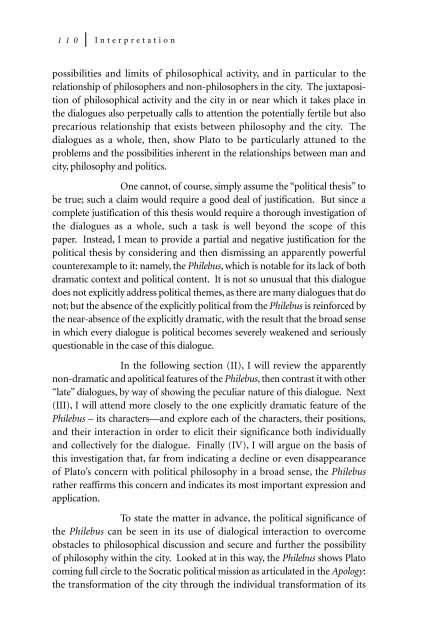Spring 2007 - Interpretation: A Journal of Political Philosophy
Spring 2007 - Interpretation: A Journal of Political Philosophy
Spring 2007 - Interpretation: A Journal of Political Philosophy
You also want an ePaper? Increase the reach of your titles
YUMPU automatically turns print PDFs into web optimized ePapers that Google loves.
1 1 0 I nterpretation<br />
possibilities and limits <strong>of</strong> philosophical activity, and in particular to the<br />
relationship <strong>of</strong> philosophers and non-philosophers in the city. The juxtaposition<br />
<strong>of</strong> philosophical activity and the city in or near which it takes place in<br />
the dialogues also perpetually calls to attention the potentially fertile but also<br />
precarious relationship that exists between philosophy and the city. The<br />
dialogues as a whole, then, show Plato to be particularly attuned to the<br />
problems and the possibilities inherent in the relationships between man and<br />
city, philosophy and politics.<br />
One cannot, <strong>of</strong> course, simply assume the “political thesis” to<br />
be true; such a claim would require a good deal <strong>of</strong> justification. But since a<br />
complete justification <strong>of</strong> this thesis would require a thorough investigation <strong>of</strong><br />
the dialogues as a whole, such a task is well beyond the scope <strong>of</strong> this<br />
paper. Instead, I mean to provide a partial and negative justification for the<br />
political thesis by considering and then dismissing an apparently powerful<br />
counterexample to it: namely, the Philebus, which is notable for its lack <strong>of</strong> both<br />
dramatic context and political content. It is not so unusual that this dialogue<br />
does not explicitly address political themes, as there are many dialogues that do<br />
not; but the absence <strong>of</strong> the explicitly political from the Philebus is reinforced by<br />
the near-absence <strong>of</strong> the explicitly dramatic, with the result that the broad sense<br />
in which every dialogue is political becomes severely weakened and seriously<br />
questionable in the case <strong>of</strong> this dialogue.<br />
In the following section (II), I will review the apparently<br />
non-dramatic and apolitical features <strong>of</strong> the Philebus, then contrast it with other<br />
“late” dialogues, by way <strong>of</strong> showing the peculiar nature <strong>of</strong> this dialogue. Next<br />
(III), I will attend more closely to the one explicitly dramatic feature <strong>of</strong> the<br />
Philebus – its characters—and explore each <strong>of</strong> the characters, their positions,<br />
and their interaction in order to elicit their significance both individually<br />
and collectively for the dialogue. Finally (IV), I will argue on the basis <strong>of</strong><br />
this investigation that, far from indicating a decline or even disappearance<br />
<strong>of</strong> Plato’s concern with political philosophy in a broad sense, the Philebus<br />
rather reaffirms this concern and indicates its most important expression and<br />
application.<br />
To state the matter in advance, the political significance <strong>of</strong><br />
the Philebus can be seen in its use <strong>of</strong> dialogical interaction to overcome<br />
obstacles to philosophical discussion and secure and further the possibility<br />
<strong>of</strong> philosophy within the city. Looked at in this way, the Philebus shows Plato<br />
coming full circle to the Socratic political mission as articulated in the Apology:<br />
the transformation <strong>of</strong> the city through the individual transformation <strong>of</strong> its

















